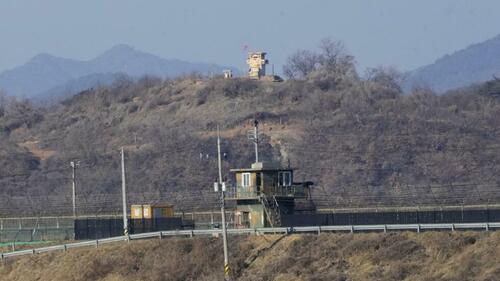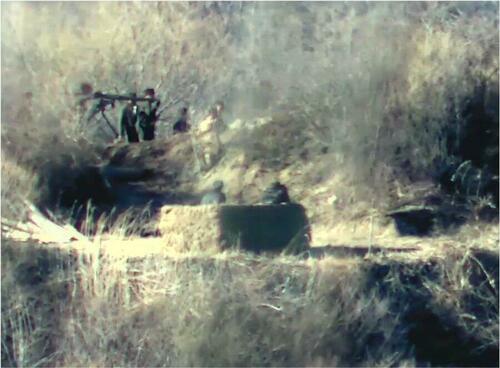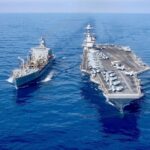
Prior years of efforts toward deconfliction based on a series of agreements between North and South Korea have been quickly unraveling, following major joint US-South Korea military drills last summer and the stationing of a US nuclear capable submarine there last July. The nuclear submarine at a South Korean port was a first in four decades.
Pyongyang responded predictably by ramping up ballistic missile tests, and most recently launching a spy satellite into orbit for the first time. But South Korea's Defense Ministry on Monday announced a big major step backward, saying the north has begun building up heavy weapons along its border, while reestablishing guard posts.

Reconstructing militarized border positions appears to be the Kim Jong Un government's response to the south last week suspending participation in a pact meant to avert war.
Seoul said this means it will resume surveillance flights along the border. Pyongyang promptly issued a statement: "From now on, our army will never be bound by the September 19 North-South Military Agreement," it said last Wednesday.
And now The Guardian is detailing that "Media reports cited the South Korean military as saying it had detected troops from the North repairing camouflaged guard posts that the regime had destroyed as part of a comprehensive military agreement in 2018 designed to lower the risk of a confrontation along the heavily armed demilitarized zone (DMZ)."
North Korea has sent troops to restore border posts that were taken down as part of an earlier agreement.
— DW News (@dwnews) November 27, 2023
This comes after Seoul partially suspended a 2018 deal aimed at rapprochement, leading to Pyongyang ditching the agreement altogether. https://t.co/ud4pje6r10
Further, "The South’s military said North Korean soldiers had been observed digging trenches at sites along the border and the regime had sent heavy weapons to the area," The Guardian continues. "The DMZ has divided the two countries since the end of the 1950-53 Korean war and is seen as a potential flashpoint in any future inter-Korean conflict."
The South Korean Defense Ministry says it can prove the DPRK is remilitarizing the border, having released a photo set showing new soldiers and arms at freshly constructed outposts along the DMZ.
These same outposts had been destroyed over recent years as relations warmed and tensions eased between the US, South Korea, and North Korea.
South Korean President Yoon Suk Yeol ordered the military to be on a high state of readiness and to monitor troop movements along the border and DMZ. The satellite launch has remained a key issue of contention.
North Korea's Kim had hailed "new era of a space power" with the Malligyong-1 reportedly in orbit. Pyongyang had claimed that within a mere hours after the launch, Kim was reviewing images of American military bases in Guam.
Prior years of efforts toward deconfliction based on a series of agreements between North and South Korea have been quickly unraveling, following major joint US-South Korea military drills last summer and the stationing of a US nuclear capable submarine there last July. The nuclear submarine at a South Korean port was a first in four decades.
Pyongyang responded predictably by ramping up ballistic missile tests, and most recently launching a spy satellite into orbit for the first time. But South Korea’s Defense Ministry on Monday announced a big major step backward, saying the north has begun building up heavy weapons along its border, while reestablishing guard posts.

Reconstructing militarized border positions appears to be the Kim Jong Un government’s response to the south last week suspending participation in a pact meant to avert war.
Seoul said this means it will resume surveillance flights along the border. Pyongyang promptly issued a statement: “From now on, our army will never be bound by the September 19 North-South Military Agreement,” it said last Wednesday.
And now The Guardian is detailing that “Media reports cited the South Korean military as saying it had detected troops from the North repairing camouflaged guard posts that the regime had destroyed as part of a comprehensive military agreement in 2018 designed to lower the risk of a confrontation along the heavily armed demilitarized zone (DMZ).”
North Korea has sent troops to restore border posts that were taken down as part of an earlier agreement.
This comes after Seoul partially suspended a 2018 deal aimed at rapprochement, leading to Pyongyang ditching the agreement altogether. https://t.co/ud4pje6r10
— DW News (@dwnews) November 27, 2023
Further, “The South’s military said North Korean soldiers had been observed digging trenches at sites along the border and the regime had sent heavy weapons to the area,” The Guardian continues. “The DMZ has divided the two countries since the end of the 1950-53 Korean war and is seen as a potential flashpoint in any future inter-Korean conflict.”
The South Korean Defense Ministry says it can prove the DPRK is remilitarizing the border, having released a photo set showing new soldiers and arms at freshly constructed outposts along the DMZ.
These same outposts had been destroyed over recent years as relations warmed and tensions eased between the US, South Korea, and North Korea.
South Korean President Yoon Suk Yeol ordered the military to be on a high state of readiness and to monitor troop movements along the border and DMZ. The satellite launch has remained a key issue of contention.
North Korea’s Kim had hailed “new era of a space power” with the Malligyong-1 reportedly in orbit. Pyongyang had claimed that within a mere hours after the launch, Kim was reviewing images of American military bases in Guam.
Loading…






